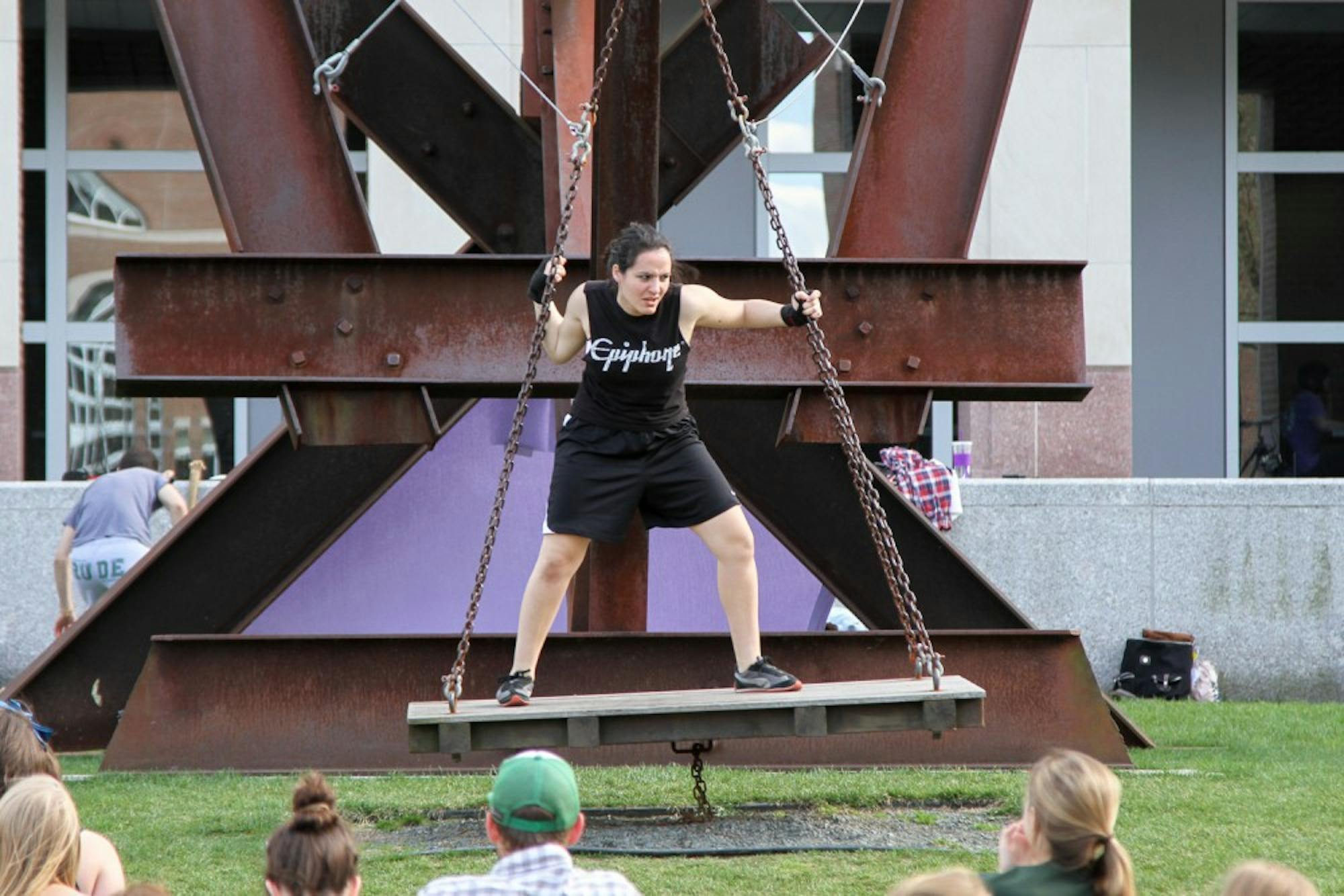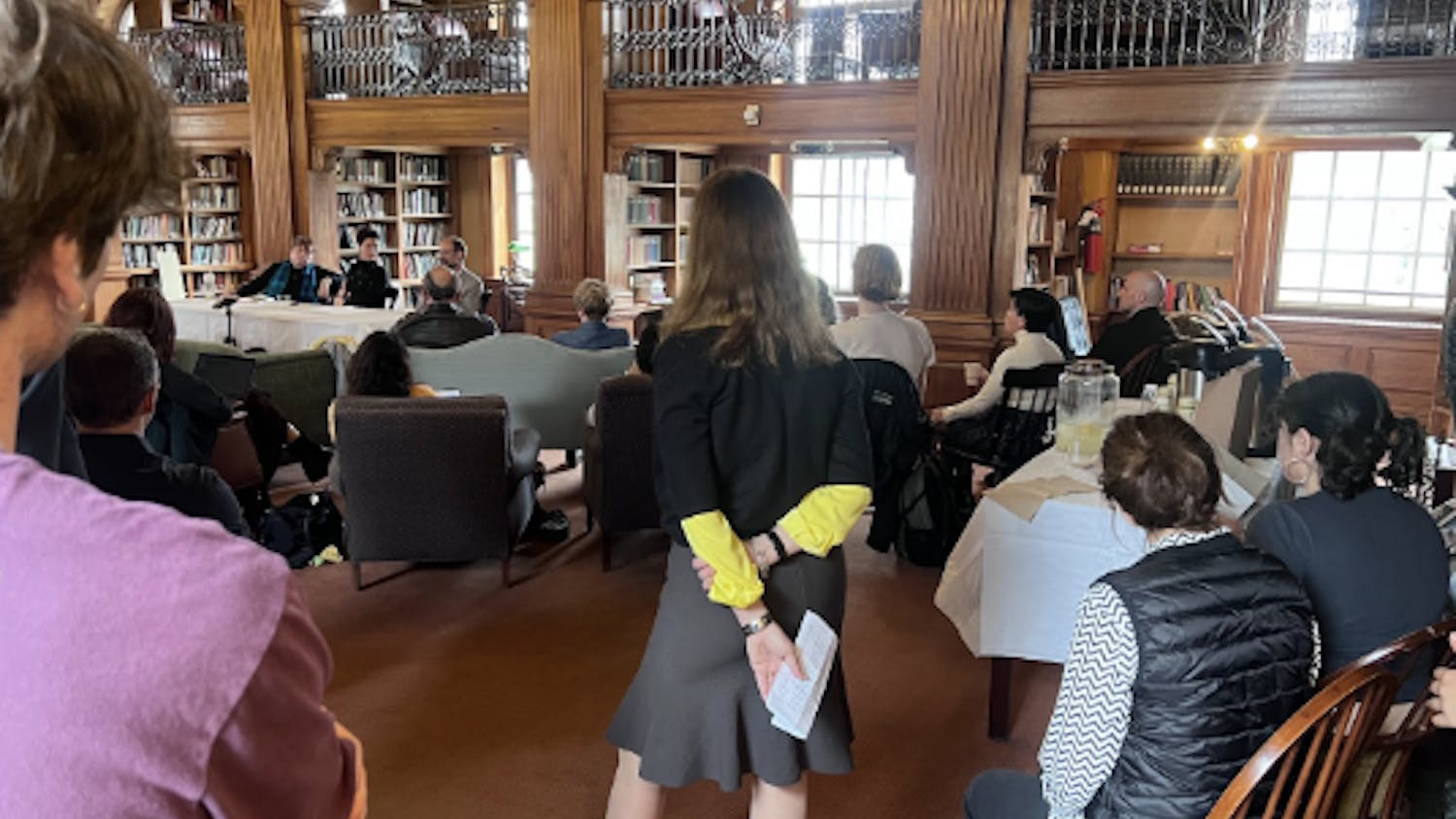“All the world’s a stage,” Luke Katler ’15, artistic director of the Dartmouth Rude Mechanicals, quipped during the group’s opening performance of “As You Like It” on Friday evening. Putting a modern spin on Shakespeare’s classic with contemporary costumes and some added barbs, the group entertained while providing implicit commentary about gender roles.
The performance, set to occur in Kemeny Courtyard, instead took place in its rain location, Silsby 28. The performances on Saturday and Sunday took place outside as planned.
The complicated plot of one a Shakespeare classic features multiple love triangles, cross-dressing and dry humor. It centers on Rosalind, played by Natalie Shell ’15, who is banished by her uncle and flees into the Forest of Arden. Here, disguised as a man, she advises the man she loves, Orlando, played by Nathan Grice ’16. Much of the show’s comedy derived from the exaggerated gender depictions in the show, made more explicit during scenes in which female actors played male characters and vice versa.
In his director’s note, Katler commented on Shakespeare’s “heavy-handed treatment of gender,” saying that the group was “interested in exploring the timeless idea that a woman must dress less womanly (or more manly) to assert her agency.”
Shell said that she approached Rosalind’s portrayal of a man as the character herself put on a show. She intentionally over-emphasized her performance to convey this, deepening her voice and slapping male characters on the shoulder.
“[Rosalind] draws a lot of power from being a guy, and she enjoys using that power,” Shell said.
Alison Falzetta ’15, who played both Adam and Silvius in the show, was one of many actors who toyed with gender for the performance.
The play is, at its core, a comedy. In a modern spin, actors came to the side of the stage and held up signs that translated the action onstage using modern colloquial expressions. During the scene in which Rosalind and Orlando first meet, an actor held up a sign that read “Rosalind’s mind.” Shell swooned, her character dreamily inattentive to Orlando’s words, while Grice stopped reciting his lines and began uttering “blah, blah, blah” instead. The group incorporated contemporary music into the performance, ending the show with a choreographed dance of One Direction’s “Best Song Ever.”
Audience members responded positively to the group’s modern take on the play.
Sophia Schwartz ’13, who attended the show on Friday, said that the group made Shakespeare’s dense language easy to follow.
Jaquille Jones ’16, who also attended the performance, said that the group added “the perfect amount” of modern elements into the production.
One of the show’s highlights came at the end, when the various couples partook in a group wedding presided over by Hymen, god of marriage, played by Mike Mayer ’17. With his holier-than-thou attitude, toga and dramatic hand gestures, Mayer had the audience gasping for breath with laughter.
Grice said that the group realized while reading the script that though having a god appear on stage for the marriages would have been taken seriously when the play was written, the scene would not make sense with the modern theme.
“Since we set the show in modern times, we realized that it just wouldn’t read,” he said. “We toyed with the idea of Hymen being a random drunk in the forest, but in the end we just figured that making him as overblown as possible was the best route.”
In the Friday show, the actors made use of their indoor environment. In the scene in which Orlando professes his love to Rosalind by carving their initials into trees, Grice drew on the classroom’s chalkboards, writing expressions like “Roz + Orlando 4Eva” and “Rosalind has a cutie patootie.”
The show also included more serious moments, which intentionally commented on gender roles and sexual violence. One scene featured a depiction of sexual violence, as Katler’s character, Jaques, shoved Amiens, played by Naomi Lazar ’17, while trying to kiss her and encouraging her to sing for him. Several other scenes were heavily based in traditional gender roles, which the cast identified by holding up posters that said “sexism” on them.
Falzetta called the group’s vision for bringing attention to these moments “ambitious.”
“We tried to focus on specific gender themes because the show is based a lot around gender,” Falzetta said. “We focused on the parental abuse and sexual violence because even though it is a comedy, we wanted to show something different and make people think.”
Before the show, the cast did a workshop with the Center for Gender and Student Engagement about gender roles and labels, Shell said. She said she enjoyed playing a character who quickly switched back and forth between different genders.
“Gender is a fluid thing,” Shell said. “I think this play is great because Rosalind is able to switch between genders until you never really know what gender she is.”
The show was unique, Falzetta said, since every member of the group had input into the show’s different elements.
“We have so many different cool ideas that it becomes a patchwork of everyone’s opinions,” Falzetta said. “The show becomes the best it can be because one person thought of a funny joke or a serious moment that other members would not have thought of.”
Katler is a former member of The Dartmouth staff.




